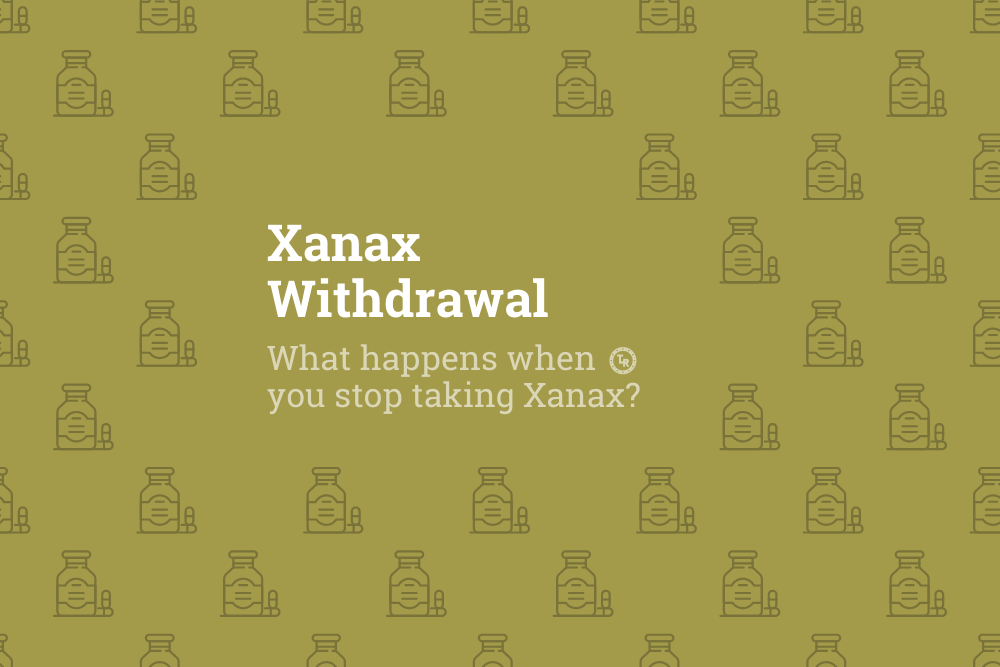Addiction Treatment
Xanax Withdrawal Symptoms

Written By:

Table of Contents
Xanax (generic name alprazolam) is a benzodiazepine prescribed for anxiety disorders. Unfortunately, some men take it without a prescription, just to get a quick relaxation effect. Over 100,000 people a year wind up in emergency rooms due to non-medical use of Xanax, often in combination with alcohol or another depressant drug.
Even when taken as a legitimate prescription, Xanax carries risks—notably the risk of addiction.
Avoiding Xanax Addiction
Benzodiazepines are particularly addictive drugs, largely because physical tolerance develops quickly. So if your doctor recommends a Xanax prescription, plan on taking it for a limited time (ideally no more than three weeks). Before you even have the prescription filled, work out a clear plan for tapering off the Xanax on schedule—and for learning to manage stress and anxiety without the pills.
Plus, be alert for signs of tolerance developing. If effects seem to diminish after a week or two, contact your prescribing doctor immediately for advice. Never just take extra pills to increase the effect: that just encourages tolerance to increase and addiction to develop faster.
Xanax Addiction Symptoms
If you’ve already developed a Xanax addiction (or suspect that a friend or family member has one), symptoms may include:
- Chronic drowsiness
- Seeming drunk, but without any smell of alcohol
- Irritability or mood swings
- Difficulty remembering or concentrating
- Sudden secretiveness: evasiveness about how much Xanax is being taken, or how much time and money is spent on it
- Deteriorating work performance
- Neglect of grooming and favorite activities
- Withdrawal symptoms (see next section) after skipping one or more regular doses
The longer you have an addiction, the harder it is to quit—plus, long-term misuse of benzodiazepines can cause brain damage, or lead to a disabling accident while under the influence. An additional concern is that addiction typically means obtaining pills from dubious sources, and many illicit “Xanax” pills contain fentanyl, a synthetic opioid so potent that two milligrams can trigger fatal overdose. Around 150 deaths a day are attributed to fentanyl, with many victims taking it unknowingly.
So the best time to get treatment for addiction is at once. Ask your doctor or health insurance representative for referral to an addiction specialist. (If you suspect someone else has Xanax addiction, it’s also a good idea to talk to a specialist, who can advise you on the best ways to help.)
Xanax Withdrawal Symptoms
Definitely do not try to quit cold turkey. Addiction to benzodiazepines, and Xanax in particular, comes with especially severe withdrawal symptoms. Seizures, convulsions, irregular heartbeat, psychotic episodes, and depression to the point of suicide are all possible.
Under professional treatment, you’ll get supervision and medication to ease the worst withdrawal effects. Even then, don’t expect things to be painless. Especially around the middle of the first week, you may experience:
- Headaches
- Muscle aches and spasms
- Nausea, perhaps accompanied by vomiting
- Heavy perspiration
- Intense tingling sensations
- Insomnia or nightmares
- Brain fog
- Mood swings
- Irritability
- Bursts of panic
It may help to know that the worst is usually over within a few days. The full detox period, however, lasts two or three months and includes follow-up care and therapy. Don’t skip this step: it’s an important tool in ridding yourself of the psychological “pull” to return to Xanax use.
You’ll probably also be coached on what to do in case of protracted withdrawal—periodically recurring symptoms that can last a year or more—which affects over 10 percent of people who detox from benzos. (The problem is more common for those who quit cold turkey—an additional reason to seek professional treatment.)
Conclusion
Especially if you pride yourself on being strong and self-sufficient, it can be hard to admit you need help quitting a Xanax (or any) addiction. Recognize that, first, addiction is an illness: it’s no “weaker” to see a doctor than if you needed a broken leg set. Don’t resist getting help because you want to deal with an issue on your own. Addiction treatment is largely about becoming stronger so you can handle your own problems.
Get Help for Benzodiazepine Addiction
If you have an addiction to Xanax or any other benzodiazepine, be aware that trying to quit cold turkey is deadly dangerous—no matter how strong and fit you are. And even if you “succeed” that way, it won’t equip you to resist future relapse temptations. You may have already quit drugs one or more times, only to slip back into old habits when life got stressful.
Be aware also that getting professional help doesn’t make you weak; it is nothing to be ashamed of. It’s a courageous and proactive step toward building a better future.
At The Last Resort, we understand what men need for long-term recovery. Our treatment programs are designed by medical experts to help you overcome addiction once and for all. Contact us today to learn more.
Recommended articles:
- “Alprazolam.” (National Library of Medicine)
- “Austin police warn of counterfeit prescription oxycodone, Xanax pills.” (Fox7Austin.com, 04/20/2020)
- “Fentanyl Facts.” (Centers for Disease Control and Prevention)
- “Risks Associated with Long-Term Benzodiazepine Use.” (American Family Physician, 08/15/2013)
- “What Is Benzodiazepine Protracted Withdrawal?” (Benzodiazepine Information Coalition)
- “What you need to know about Xanax.” (MedicalNewsToday.com)
- “Xanax Withdrawal Symptoms, and What You Can Do About Them.” (WebMD.com)
